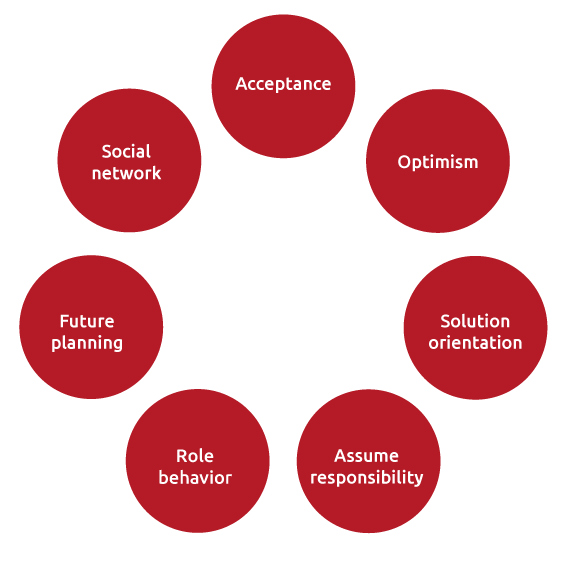Anyone with a good immune system can consider themselves lucky. When the body’s defenses are fit, they do a lot to keep us healthy. But in stressful situations, a good “psychological immune system” is just as crucial for staying healthy. Resilience is the ability to face and overcome life`s hardships and difficulties. In today’s working world, we are faced with a lot of challenges and pressures. In addition, there are demands from our personal lives and from society. Inner strength and psychological resilience are enormously helpful with all of this.
However, being a resilient person is not about letting nothing upset you and seeing everything through rose-colored glasses. Resilience is also not a vacuum cleaner that swallows problems, difficult experiences and sorrow.
The term resilience (lat. resilire = to bounce back, rebound) originally comes from physics and describes the ability of a material to be deformed and still return to its original shape afterwards. Resilience thus generally stands for the tolerance of a system to disturbances. Imagine a bamboo that bends in the wind instead of breaking and straightens up again when the storm has subsided.
At first glance, this internal resilience seems like a certain robustness. More accurate, however, are the characteristics of adaptability and recoverability.
So how do you get this “superpower”?
It used to be assumed that resilience was largely genetically determined. In the meantime, it is known only a small part of inner resilience is inherited. This means that it is a quality that each one of us can (further) develop – at any time! It is a question of mindset, curiosity and willingness to learn.
If you are already in the midst of a crisis, it is of course not exactly easy to rethink your usual attitudes and behaviors. On the other hand: Especially in completely new, unknown situations, there is no habitual pattern of behavior to fall back on. In the necessity to adjust completely anew, there is also the chance to acquire a new, more resilient way of thinking and acting.
And even in “normal” everyday life, there are enough situations and opportunities to build up and strengthen resilience factors. This lays the foundation for acting resiliently even in stressful times and hard phases of life.
On the next page, we present everyday strategies and challenges for each resilience pillar. These are effective tools for strengthening the mental immune system in the context of everyday challenges and unpleasant experiences.
Maybe you are interested in your personal resilience level? Resilience is not that easy to measure, but with this short resilience check you will get a good first assessment.





